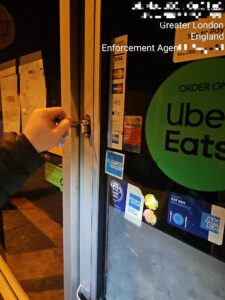Forfeiture of Lease London: £595 (+ VAT) & locksmith’s fee if needed.

When a landlord exercises their right to reclaim peaceful possession of a property against the tenant’s wishes, this is known as forfeiture.
Forfeiture typically occurs when a tenant breaches a covenant or clause in the lease. A bailiff (Certified Enforcement Agent) generally carries out the forfeiture by entering the property when the business isn’t trading and takes vacant possession.
Section 24(2) of the Landlord and Tenant Act 1954 protects the contractual right of forfeiture under the lease.
According to most leases, the landlord’s bailiff must peacefully enter any part of the property, including any outdoor areas, to secure peaceful possession.
Forfeiture of a Lease is a useful tool when you cannot execute Commercial Rent Arrears Recovery (CRAR) because the bailiff (certificated enforcement agent) is unable to gain entry to the property. It can also be used when there are little or no goods to seize, or if the goods on the premises belong to third parties.
Currently, a landlord can forfeit a tenancy on several grounds, depending on the lease’s wording. The most common reason is non-payment of rent. Other grounds include:
- Breach of tenancy terms by the tenant.
- Insolvency, such as bankruptcy, liquidation, or an insolvency arrangement like administration or the appointment of a receiver.
- Improper use of the property.
- Change of use without permission.
- Subletting.
- Nuisance behaviour or excessive noise.
In addition to seeking damages for these violations, the landlord may also wish to reclaim their property.
The landlord can only take action to forfeit the tenancy if the lease includes a “forfeiture clause.”
After a violation, the forfeiture clause allows the landlord’s bailiff (certified enforcement agent) to “re-enter” the property.
Typically, a lease’s forfeiture clause would state something like: “The landlord may peacefully re-enter and forfeit the lease if the rent is not paid within 21 days.”
Depending on the nature of the violation, the landlord may or may not be required to issue the proper notice under Section 146 of the Law of Property Act 1925.
Cost: £595 (+VAT), plus the locksmith’s fee.
The average locksmith cost is £150, but the price may vary depending on the volume and the type of locks that need to be replaced. We can provide a quote for the locksmith upon request. Please note that the cost will depend on the types of locks used and the number of locks on the property.
Payable by the commercial landlord.
Contact London Evictions Today for Fast and Effective Eviction Services
If you’re facing eviction issues in London, don’t delay. Our expert team at London Evictions is here to help. Contact us today for a consultation or more information about our eviction services. We’ll handle your case professionally, swiftly, and in full compliance with the law.
Contact us at:
📞 0800 634 9264
✉️ [email protected]